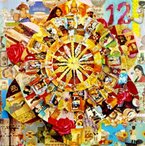Why clean the mess?
Disclaimer: This post is not a validation of messiness. So please refrain from deriving guilt relief from it!
My mentor is junior college had a plaque on her desk that said, “A clean desk is the sign of a sick mind.” I didn’t think if it was true but I enjoyed the audacity of this one sentence in a country that boasts of relentless organization, and immaculate order, predictability. In retrospect, though the statement was a bit of an overkill, it stayed with me. And I wondered if organization was over-rated? Why is there only one prescribed way of doing things? Does it suit us all to be organized?
In a delightful tale of subtle humour and irony Fitzgerald touches on the sides of organization we tend to neglect. In“Gretchen’s Forty Winks”, tables turn when Tomkins, the guy who talks of organization, balance in life has a nervous breakdown while Roger,the workaholic, wins his due. The humour has an element of surprise, the doctor says, “ He worked pretty hard at keeping his life balanced.” I almost laughed aloud. It drove home a point, the guy who works with no sense of day and night, puts no thinking on the way he is going about his work but rather he is concentrated on the work itself. The sheer task of keeping things organized could be a pressure. Not to mention the frustration of unfortunately misplacing something in spite of the organization. For those who do not emphasise on organization the mind gets accustomed to certain lapses, misplacement becomes a part of the routine. Maybe there is no real time advantage or ‘efficiency’ attached to organization??
Some research indicates a different kind of organization that helps right-brained individuals. They have non-linear patterns of listing ,they find the usual ways of filing un-natural. I am highly sceptic of dualities hence will take this with a pinch of salt. In any case, I believe that the important thing to remember is that individuals are different. In a liberalised world (at least in the ideal sense), we should make room for differences- even in the way we work.
For what its worth, dis-organization comes with its perks just like organization does. Just think about it, walking into a cluttered room is cozy sometimes, even more welcoming. Working with non-linear lists helps us discover new ways of doing certain things. Creativity and structure are a bit of a misfit. Maybe there is another side to organization.
For those interested, I just discovered a book that tells you more about the uses of messiness
:A perfect Mess(Jan 2007!)





